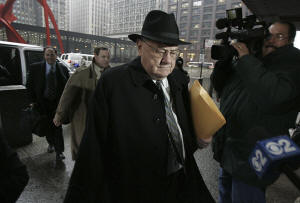Former Illinois Gov. George Ryan dies at 91. He halted executions and
went to prison for corruption
[May 03, 2025]
By CHRISTOPHER WILLS and JOHN O'CONNOR
SPRINGFIELD, Ill. (AP) — Former Illinois Gov. George Ryan, disgraced by
a corruption scandal that landed him in prison yet heralded by some for
clearing the state’s death row, has died. He was 91.
Kankakee County Coroner Robert Gessner, a family friend, said Ryan died
Friday afternoon at his home in Kankakee, where he was receiving hospice
care.
Ryan started out a small-town pharmacist but wound up running one of the
country’s largest states. Along the way, the tough-on-crime Republican
experienced a conversion on the death penalty and won international
praise by halting executions as governor and, eventually, emptying death
row.
He served only one term as governor, from 1999 to 2003, that ended amid
accusations he used government offices to reward friends, win elections
and hide corruption that played a role in the fiery deaths of six
children. Eventually, Ryan was convicted of corruption charges and
sentenced to 6½ years in federal prison.
During his more than five years behind bars, Ryan worked as a carpenter
and befriended fellow inmates, many of whom addressed him as “governor.”
He was released in January 2013, weeks before his 79th birthday, looking
thinner and more subdued.
He’d been defiant heading to prison. The night before he went in, Ryan
insisted he was innocent and would prove it. But when Ryan asked
President George W. Bush to grant him clemency in 2008, he said he
accepted the verdict against him and felt “deep shame.”

“I apologize to the people of Illinois for my conduct,” Ryan said at the
time.
Ryan was still serving his sentence when his wife, Lura Lynn, died in
June 2011. He was briefly released to be at her deathbed but wasn’t
allowed to attend her funeral. On the day he left prison and returned to
the Kankakee home where he and his wife had raised their children, one
of his grandchildren handed him an urn containing his wife’s ashes.
Born in Iowa and raised in Kankakee, Ryan married his high school
sweetheart, followed his father in becoming a pharmacist and had six
children. Those who knew Ryan described him as the ultimate family man
and a neighbor’s neighbor, someone who let local kids use his basketball
court or rushed to Dairy Queen to buy treats when they missed the ice
cream truck.
“He’s even offered to deliver the papers,” newspaper delivery boy Ben
Angelo said when Ryan was running for governor. “He was serious.”
In 1968, Ryan was appointed to fill an unexpired term on the county
board, beginning a quick rise in politics. Eventually, he served as
speaker of the Illinois House, lieutenant governor, secretary of state
and, finally, governor.
A glad-handing politician from the old school, Ryan emphasized
pragmatism over ideology. He worked with officials from both parties and
struck deals on the golf course or during evenings of cigars and booze.
Ryan helped block the Equal Rights Amendment in the early 1980s during
his term as speaker of the Illinois House, triggering some of the most
heated demonstrations ever seen at the Capitol.
“They wrote my name in blood on the floor in front of the House, in
front of the governor’s office,” Ryan said. “They were trying, hectic
times, frankly.”
His willingness to set aside party orthodoxy sometimes put him at odds
with more conservative Republicans.

[to top of second column]
|

Former Gov. George Ryan arrives at federal court in Chicago for the
first day of final arguments in his racketeering and corruption
trial on Monday, March 6, 2006. (AP Photo/M. Spencer Green, File)

He led a failed effort in 1989 to get the General Assembly to
restrict assault weapons. He backed gambling expansion. He became
the first governor to visit Cuba since Fidel Castro took power. And
in 2000, after signing off on the execution of one killer, he
decided not to carry out any more. He imposed a moratorium on
executions and began reviewing reforms to a judicial system that
repeatedly sentenced innocent men to die.
Ultimately, Ryan decided no reforms would provide the certainty he
wanted. In virtually his last act as governor, he emptied death row
with pardons and commutations in 2003.
“Because the Illinois death penalty system is arbitrary and
capricious — and therefore immoral — I no longer shall tinker with
the machinery of death,” Ryan said.
Ryan found himself mentioned as a contender for the Nobel Peace
Prize at the same time federal prosecutors were closing in. Before
year’s end, he would be charged with taking payoffs, gifts and
vacations in return for steering government contracts and leases to
cronies, as well as lying to investigators and cheating on his
taxes.
Much of the illegal activity took place during Ryan’s two terms as
Illinois secretary of state, including the 1994 deaths of six
children. They burned to death after their minivan struck a part
that had fallen off a truck whose driver got his license illegally
from Ryan’s office.
Federal investigators found that Ryan had turned the secretary of
state’s office into an arm of his political campaign, pressuring
employees for contributions — some of which came through bribes from
unqualified truck drivers for licenses. After the children’s deaths,
Ryan also gutted the part of his office responsible for rooting out
corruption.

Then as governor, he steered millions of dollars in state leases and
contracts to political insiders who in turn provided gifts such as
trips to a Jamaican resort and $145,000 loans to his brother’s
struggling business, investigators found. He was convicted on all
charges April 17, 2006.
The father of the six dead children criticized Ryan’s attitude at
the time.
“There was no remorse in George Ryan after the verdict. That didn’t
surprise me. That’s Ryan’s same attitude, a chip on the shoulder,”
said the Rev. Scott Willis. “It makes it a little easier to feel
elation. His attitude confirms the verdict was right.”
Anger at Ryan weakened Republicans for years and energized the
gubernatorial campaign of a charismatic young Democrat who promised
to clean up Springfield — Rod Blagojevich. Later, as federal
investigators probed his own conduct, Blagojevich would call for
Ryan to be granted clemency and released from prison.
___
Wills, a former Associated Press staffer, was the principal writer
of this obituary.
All contents © copyright 2025 Associated Press. All rights reserved |